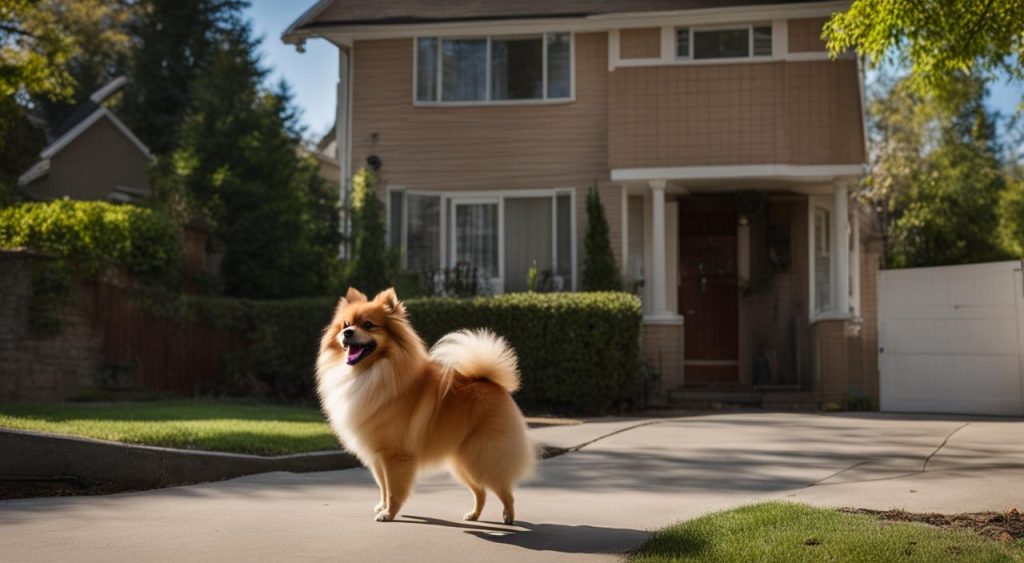Are you considering bringing a Pomeranian into your home? If so, you may be wondering about their barking habits. Pomeranians are known for their vocal nature and can sometimes bark more than other dog breeds. In this article, we will delve into the topic of Pomeranian barking, exploring the reasons behind their excessive barking and offering tips on how to manage and control it.
Key Takeaways:
- Pomeranians are a vocal breed and may bark more frequently than other dogs
- Not all Pomeranians bark excessively, and the intensity of their barking can vary
- Understanding the reasons behind Pomeranian barking can help owners effectively manage and control this behavior
- Common reasons for Pomeranian barking include communication, alerting owners, seeking attention, boredom, distress, and excitement
- Proper exercise, mental stimulation, and positive reinforcement training techniques can help reduce excessive barking in Pomeranians
Why Do Pomeranians Bark So Much?
Pomeranians are known for their vocal nature and can bark more frequently compared to other dog breeds. Understanding the reasons behind Pomeranian barking can help you effectively manage this behavior and create a harmonious living environment for both you and your furry friend.
There are various reasons why Pomeranians bark, including:
– Communication: Pomeranians use barking as a way to communicate with their owners and other animals. It can be their way of expressing their needs, desires, or simply engaging in conversation.
– Alerting to potential threats: Pomeranians have a protective instinct, and they may bark to notify you of strangers or unusual activities. It is their way of alerting you to a potential threat.
– Seeking attention: Like many other dogs, Pomeranians may bark to get your attention. They may want to play, go for a walk, or simply seek some affection from you.
– Boredom: Pomeranians are intelligent and active dogs. When they are bored or lack mental stimulation, they may resort to barking as a way to entertain themselves or relieve their restlessness.
– Distress: If a Pomeranian feels distressed or unwell, they may resort to barking to express their discomfort or seek help.
– Excitement: Pomeranians can get easily excited, especially when they anticipate something they enjoy, such as mealtime or going for a car ride. Barking can be their way of expressing their excitement.
Understanding these underlying reasons for Pomeranian barking can help you address and manage this behavior effectively. By providing appropriate mental stimulation, training, and attention, you can help your Pomeranian find healthier ways to communicate and reduce excessive barking.
How to Manage Pomeranian Barking
When it comes to managing Pomeranian barking, there are several strategies you can employ to help reduce excessive barking and create a peaceful living environment for both you and your furry friend.
One important aspect is providing your Pomeranian with proper exercise and mental stimulation. Regular physical activity and engaging playtime help prevent boredom and restlessness that can lead to excessive barking. Taking your Pomeranian for daily walks or engaging in interactive games can help them release energy in a constructive way.
Training techniques using positive reinforcement can also be effective in teaching Pomeranians when it’s appropriate to bark and when to remain quiet. Rewarding your Pomeranian when they exhibit desired behavior, such as staying calm in a specific situation, can reinforce the behavior you want to see more of. Consistency and patience are key in this training process.
“Positive reinforcement training techniques can be used to teach Pomeranians the appropriate times to bark and when to remain quiet.”
In some cases, excessive barking may be triggered by underlying anxiety or fear issues. It’s essential to address these underlying factors to effectively manage your Pomeranian’s barking behavior. Consulting with a professional trainer or veterinarian can provide you with the guidance and support needed to address these issues effectively.
Remember, each Pomeranian is unique, and finding the right approach to manage their barking may require some trial and error. Patience and consistency are key in helping your Pomeranian learn and adapt to desired barking behaviors.
By implementing these tips and strategies, you can effectively manage and control your Pomeranian’s barking, creating a harmonious living environment for both you and your furry companion.
Conclusion
Managing Pomeranian barking doesn’t have to be a challenge. By understanding the reasons behind their excessive barking and implementing effective techniques, you can create a peaceful living environment for both you and your Pomeranian.
Each Pomeranian is unique, so finding the right approach to manage their barking may require some patience and consistency. However, with the right training and stimulation, you can significantly reduce their excessive barking.
To successfully manage Pomeranian barking, it’s crucial to address the underlying reasons behind their vocalizations. Whether it’s boredom, anxiety, or the need for attention, identifying the root cause will enable you to implement appropriate strategies.
Positive reinforcement training techniques can be a highly effective way to control Pomeranian barking. Rewarding your Pomeranian for remaining quiet during appropriate times and redirecting their focus can help establish desirable behavior patterns.
Remember, managing Pomeranian barking requires time, consistency, and understanding. By implementing these effective techniques and providing appropriate mental and physical stimulation, you can enjoy a harmonious relationship with your beloved Pomeranian.





